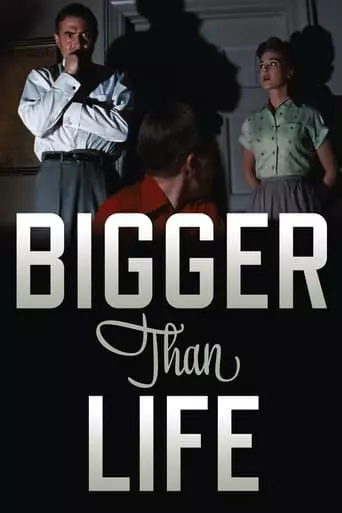
Bigger Than Life (1956) Watch Online Free
A friendly, successful suburban teacher and father grows dangerously addicted to cortisone, resulting in his transformation into a household despot.
Bigger Than Life (1956), directed by Nicholas Ray, is a psychological drama that explores the consequences of a man’s dependency on a life-saving but dangerous drug. The film follows Ed Avery (James Mason), a suburban school teacher, who is diagnosed with a life-threatening illness. To save him, his doctor prescribes cortisone, a new wonder drug at the time. While it initially saves Ed’s life, the drug’s severe side effects begin to alter his personality, making him paranoid, aggressive, and increasingly authoritarian. His once loving family, including his wife Lou (Barbara Rush) and son Richie (Christopher Olsen), find themselves at the mercy of his changing behavior. As Ed’s mental state deteriorates, he becomes more controlling and even violent, leading to a dramatic confrontation with his family and friends.
Bigger Than Life is a multi-layered film that addresses several significant themes, including the dangers of medical overreach, the fragility of the American family, and the societal pressures of the 1950s. The film critiques the overuse of prescription drugs, particularly in the context of the post-war American middle class. Ed’s descent into madness is a direct result of the cortisone, which, while saving his life, distorts his perceptions and exacerbates his latent feelings of inadequacy and dissatisfaction with suburban life. The film highlights the dangers of placing too much trust in medical interventions without fully understanding their side effects.
The film also explores the tension between the idealized American family and the reality of suburban life. Ed’s transformation challenges the traditional family structure, as his domineering behavior forces Lou to question her role as a wife and mother. This examination of family dynamics is framed within the context of 1950s conformity, which is critiqued through Ed’s increasing authoritarianism and the way his condition amplifies societal issues such as gender roles and the pursuit of success.
Additionally, the film can be seen as a critique of masculinity. Ed’s behavior, particularly his desire to control and dominate, reflects the pressures placed on men during this era to be providers and strong figures in their families. His breakdown and subsequent attempts to regain control of his life reveal the fragility of this idealized masculinity.
Upon its release, Bigger Than Life received mixed reviews, with some critics finding its portrayal of medical issues melodramatic. However, over time, the film has been recognized for its bold exploration of societal and psychological issues. French critics, including Jean-Luc Godard and François Truffaut, hailed the film as a masterpiece, praising its critique of American life and its complex portrayal of human emotions. Today, it is regarded as one of Nicholas Ray’s most important works, a precursor to later films that would deal with themes of drug addiction and psychological breakdown.
The film’s impact lies in its ability to balance a domestic drama with an exploration of larger societal concerns. Its portrayal of a man losing control due to external forces, and the subsequent strain on his family, resonates with modern audiences who are more aware of the psychological and social implications of mental illness and addiction.
After watching Bigger Than Life, viewers are likely to feel a mixture of unease and reflection. The film’s portrayal of a man’s descent into madness, exacerbated by medical intervention, leaves a lasting impact, making one question the boundaries between health and illness, normality and madness. The tension within the family, coupled with the psychological intensity of Ed’s transformation, creates a sense of claustrophobia that lingers after the credits roll.
The film’s critique of 1950s American life, with its emphasis on conformity and the idealized family unit, may also evoke a sense of disillusionment. While the film ends on a note of familial reconciliation, the viewer is left to ponder the costs of maintaining such a fragile social order. Ultimately, Bigger Than Life challenges the viewer to consider the complexities of identity, family, and the American Dream, making it a thought-provoking experience.
In summary, Bigger Than Life is a film that not only explores the personal breakdown of an individual but also critiques broader societal issues. It is a film that demands thought and introspection, leaving viewers with lingering questions about the nature of control, conformity, and the human psyche.
